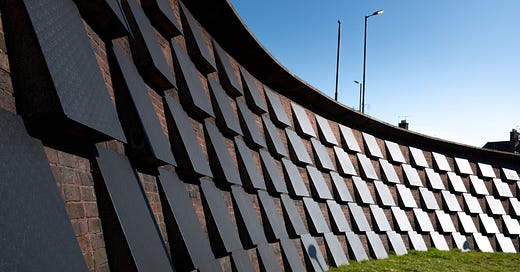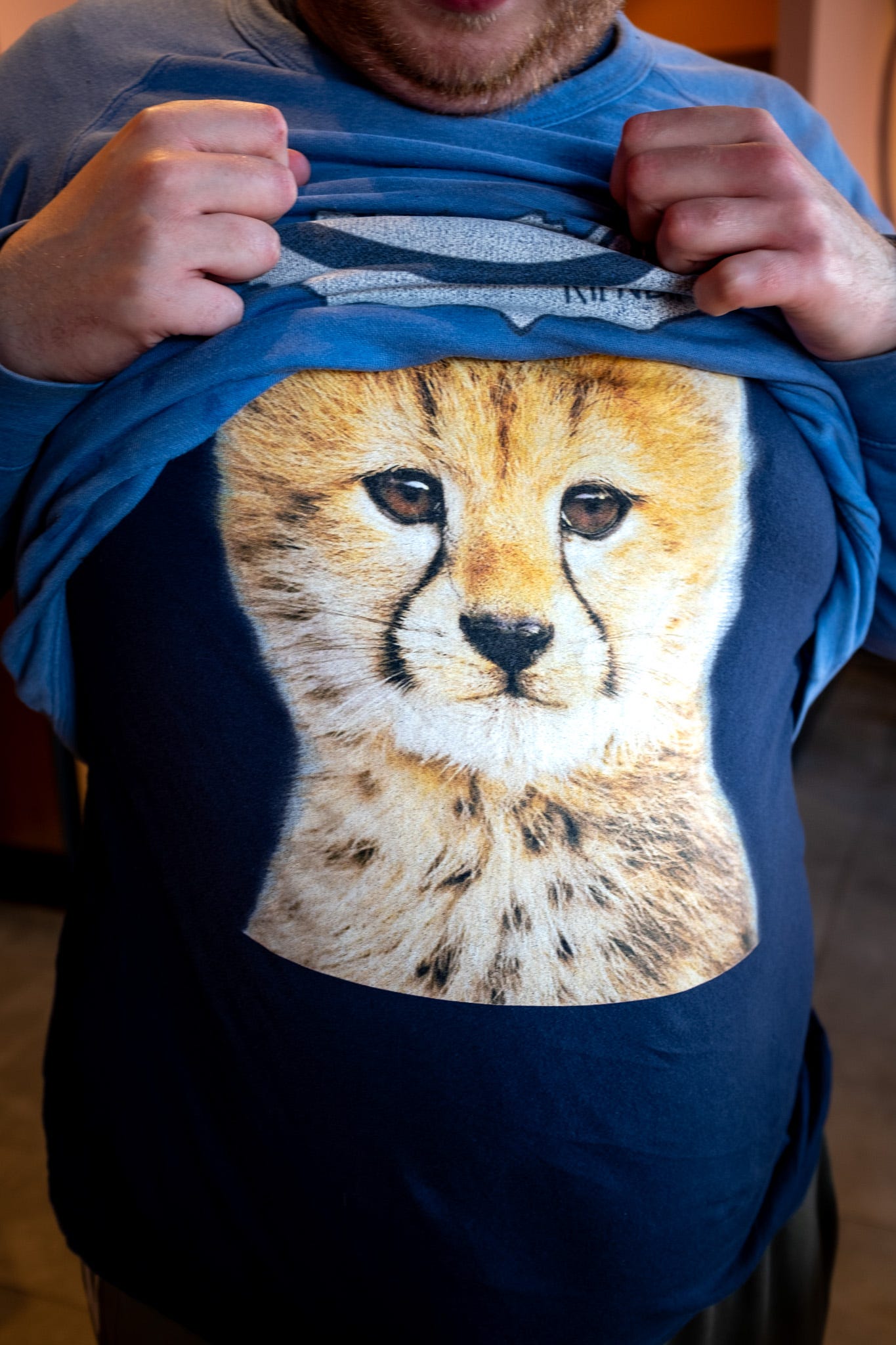40 years ago exactly, my dad used to stand here. Where precisely he wasn’t sure, but somewhere around here, at the bottom of the A1. Where it connects to London’s web. Apex Corner.
He was a student at Newcastle. He would hitch the long road there before graduating in 1985. He didn’t hitch much in Britain after that. Hung up his thumb as it were. In truth, he couldn’t remember why he hitched to uni. He had a VW Campervan of his own.
“There are two things which set hitch-hiking apart from any other mechanised transport,” the final edition of the Hitch-hiker’s Manual, Britain says, published that very same year. “Most important is that it is free, but it also enables you—in fact compels you—to meet and converse with complete strangers.”
I suppose that was the reason.
Dad says he swore by a student scarf. That way drivers knew who you were. In those days, you often had to stand out from a crowd of competitor hitchhikers. The Manual had an entire section on queuing etiquette.
Needless to say, times have changed. I didn’t have a student scarf, not least because I wasn’t a student. I was hitching to see my younger brother who was though. In his final year in Newcastle. Recreating the very journey Dad made.
The journey up to Apex Corner was long. The tube followed by two rattling bus rides up the hills of North London.
I met a young man called Andres at the final stop. He read out the name of the book in my hand in a thick Hispanic accent. He was Colombian, 17 years old, at college. He said he’d come to the UK because - he clenched both fists and knocked them together, but couldn’t find the word. Something to do with drugs and fighting.
The roundabout at Apex Corner is large, its centre sunken into the ground in a perfect circle, like a button that’s been pressed and got stuck. The footpath runs down through this arena. The backs of lorries revolving above, round and round. Spinning off onto the A1 or A41, or dissolving into London.
There used to be a service station here, owned by a Major of the Royal Flying Corps, a veteran of the First War. His name was John Drysdale and he was wounded flying behind enemy lines, back when the life expectancy for pilots was weeks, counted on one hand.
After the war he bought a small plot on the edge of the new roundabout at the bottom of the new A1. He set up a car service station and named it Apex Garage. The roundabout has been Apex Corner ever since.
I was there by 10 am. Google said you could drive to Newcastle in 5 hours. By my reckoning, hitchhiking takes twice as long. ETA 8 pm.
It took nearly two hours to get a lift. A bad start. It was a white Tesla that pulled in. Both the driver and the passenger were wearing big headphones. They still heard me alright. The driver told me they were going to Hamerton Zoo, a way up the A1.
The driver was Jeremy, a carer by work. He looked after the man in the passenger seat, Neil. A colleague was supposed to take him today but she couldn’t drive and the public transport was difficult. Jeremy decided it would be easier to take him up in the Tesla—an excuse to get on the road.
Jeremy bought the Tesla two years ago but he’d only passed his test in October. He’d spent 18 months just watching Netflix in it. “Yes, that was stupid,” he reflected. He drove it quickly, onto the dual carriageway, the houses thinning into scrubby bushes and then fields at last.
Neil hadn’t spoken much by this point. His headphones still on, a pair of Oakleys too. He was holding his phone about two inches from his nose. Penny-sized explosions flashed across the screen, tiny people streaming this way and that. He didn’t appear to be playing, just watching.
I asked what he was looking forward to seeing at the zoo.
Cheetahs, he replied. He had a deep, anunciated voice, as if he was hosting some mythical gameshow.
“My love for them is a closely guarded secret,” he explained. “I have a cheetah mother spirit. It wants to break free from its human shell.” He said that what they lack in strength they make up for in speed.
“I also love the Snow Leopard because of two words. Masked. Singer.”
I learned that Masked Singer is a show on Saturday nights. One of the singer’s masks was a snow leopard.
We were out of London by now. It was a clear morning. The fields were neatly furrowed, bright and light brown. I saw a man walking alone up an empty white track. He wore a double-breasted suit and black sunglasses, hair slicked, carrying a briefcase. I wondered why.
Neil was warming up, and soon we were chatting freely. He told me he’d invented an island. Barbossa Island. “Three guesses where the name came from?”
I guessed right—Pirates of the Caribbean.
“Oh aye,” he said, “If you understand the meaning of aye.”
Barbossa Island was in the far west, near Antarctica. It had been discovered by the pirate Barbossa. “He saw a rocky outcrop and said, Arrrr, here’s a rocky outcrop! and he settled there because it was even. During the day, it is minus 20 degrees and at night, it’s a punishing minus 40. In fact the only reason it’s inhabitable is two words.
“Hot.
“Springs.”
The island had tongal forest, beaches and a cave system, and there was an array of wildlife, including seagul-pigeon-vultures. Piranha anglers dwelt in the sewers, angling for piranhas whose exodermis was venous.
“I just saw roadkill,” Neil interrupted his description to inform us. “Deceased avian origin.”
Barbossa’s residents lived on the eastern seaboard. They were a motley crew. Warrio from Mario Cart, Homer Simpson, Wallace and Gromit, and Luigi. “Quite a rowdy bunch,” Neil acknowledged.
“Yoshi and Patrick Star are also on the island. They live further from the other dwellings and are united by a common love—consumption. Because you can never go wrong with that.”
Neil informed us we’d passed another deceased avian.
We found a service station just south of their junction. Jeremy pulled in and we went into Starbucks, Neil’s favourite cafe. He ordered a darkberry Frappuccino. The lady looked confused until Jeremy told her he meant blackberry.
Neil never said the word black. He thought it was racist and didn’t want to offend Jeremy. He’d say Dark Panther and Darkfriars, anything with ‘black’ was replaced with ‘dark’. Jeremy thought it was very funny and assured me that he didn’t find the word black offensive.
I asked Jeremy if he enjoyed his work. He’d done it for six years now and was a senior carer. He did, it was rewarding, but it was tough at times. I’d seen the best bits, he said.
It had felt like good progress but I’d only knocked an hour or so off. Still over four to go. I wished Jeremy and Neil a good day with the cheetahs and waved them goodbye.








Cracking writing as ever Nico. Back in the 80’s when I hitched I might have estimated a 5:30-6pm arrival for that sort of distance and road network. I am left wanting to hear more about this journey. Keep up the good work.